Minneapolis–Saint Paul International Airport
| Minneapolis–Saint Paul International Airport Wold–Chamberlain Field | |||||||||||||||||||||||
|---|---|---|---|---|---|---|---|---|---|---|---|---|---|---|---|---|---|---|---|---|---|---|---|
 | |||||||||||||||||||||||
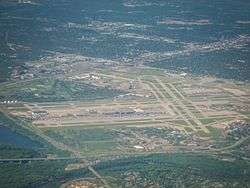 | |||||||||||||||||||||||
| Summary | |||||||||||||||||||||||
| Airport type | Public | ||||||||||||||||||||||
| Owner/Operator | Metropolitan Airports Commission | ||||||||||||||||||||||
| Serves | Minneapolis and St. Paul, Minnesota (Twin Cities) | ||||||||||||||||||||||
| Location | Hennepin County, Minnesota, U.S. | ||||||||||||||||||||||
| Hub for | |||||||||||||||||||||||
| Elevation AMSL | 841 ft / 256 m | ||||||||||||||||||||||
| Coordinates | 44°52′55″N 093°13′18″W / 44.88194°N 93.22167°WCoordinates: 44°52′55″N 093°13′18″W / 44.88194°N 93.22167°W | ||||||||||||||||||||||
| Website | www.mspairport.com | ||||||||||||||||||||||
| Maps | |||||||||||||||||||||||
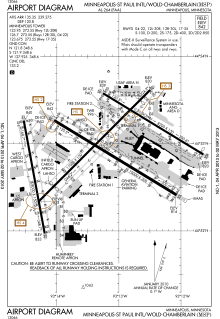 FAA airport diagram | |||||||||||||||||||||||
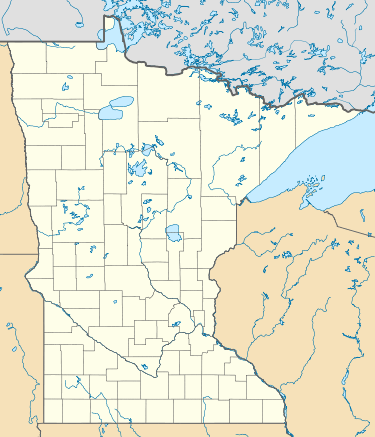 MSP Location within Minnesota  MSP MSP (the US) 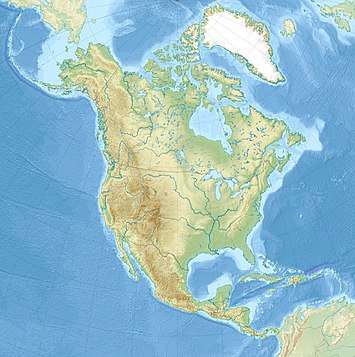 MSP MSP (North America) | |||||||||||||||||||||||
| Runways | |||||||||||||||||||||||
| |||||||||||||||||||||||
| Statistics (2017) | |||||||||||||||||||||||
| |||||||||||||||||||||||
Minneapolis–Saint Paul International Airport (IATA: MSP, ICAO: KMSP, FAA LID: MSP), also less commonly known as Wold–Chamberlain Field, is a joint civil-military public use international airport. It is located in a portion of Hennepin County, Minnesota, United States, within 10 miles (16 kilometers) of both downtown Minneapolis and Saint Paul. MSP is the largest and busiest airport in the six-state Upper Midwest region of Minnesota, Iowa, Nebraska, North Dakota, South Dakota, and Wisconsin.[3] The airport is mostly located in the census-designated place of Fort Snelling in an unincorporated portion of Hennepin County.[4] Small sections of the airport are within the city limits of Minneapolis and Richfield. However, per Minnesota state law, the land on which the airport sits is not part of any city or school district.[5]
The airport was named Best Airport in North America among air terminals that serve 25 to 40 million passengers annually, the second largest category, in 2016 and 2017 by The Airports Council International. The airport generates an estimated $15.9 billion a year for the Twin Cities' economy and supports 87,000 workers.[6]
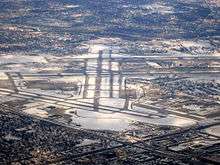
In terms of passengers, Minneapolis–Saint Paul International Airport was the 17th busiest airport in the United States and the 49th busiest in the world as of 2016. A joint civil-military airport, MSP is also home to the Minneapolis–Saint Paul International Airport Joint Air Reserve Station, supporting both Air Force Reserve Command and Air National Guard flight operations.
Of all the passengers that fly through MSP, about 40% of them are connecting from other cities with a layover at MSP and about 60% originate at the airport. Sixteen airlines operate out of MSP, serving 163 nonstop destinations from the airport, including 136 domestic and 27 international markets. Internationally, Delta Air Lines flies to five trans-oceanic destinations with year-round service to Amsterdam, London-Heathrow, Paris–Charles de Gaulle, and Tokyo–Haneda, and seasonal service to Reykjavík–Keflavík. Beginning on April 1, 2019, Delta will bring the airport its first nonstop flight to Seoul, South Korea[7] accompanying service from Atlanta, Detroit, and Seattle. In addition, Air France has seasonal service to Paris, Condor Airlines has seasonal service to Frankfurt, Icelandair has year-round service to Reykjavík, and KLM resumed year-round service to Amsterdam in March 2017, subsequently beginning MSP's first Boeing 787 service in October 2017. Also, Aer Lingus will begin year-round service to Dublin beginning on July 8, 2019. With the addition of Aer Lingus, MSP will have nonstop service to eight overseas destinations.[8] Delta and Sun Country Airlines both serve many cities throughout the Caribbean, Central America, Canada, and Mexico with seasonal or year-round service. In the coming years, Delta is expected to launch a direct route to Mexico City via their partner, AeroMéxico. Compared to other large metropolitan areas in the United States, only Atlanta and Denver serve more non-stop markets per capita.[9]
MSP is the second largest hub airport for Delta Air Lines and its Delta Connection partners.[10] Compass Airlines and Endeavor Air have their official headquarters nearby. It also serves as the home airport for Minnesota-based Sun Country Airlines. Northwest had a hub at the airport until its 2010 merger with Delta Air Lines. The Delta Connection partner Mesaba Airlines was also headquartered nearby until December 2011 as it completed its merger with Pinnacle Airlines. Delta Air Lines accounts for more than 70% of the airport's passenger traffic. The airport is operated by the Metropolitan Airports Commission, which also handles the operation of six smaller airports in the region.
History
The airport came into being when several local groups came together to take control of the former bankrupt Twin City Speedway race track, giving the airport its original name, Speedway Field. Soon after, in 1921, the airport was renamed "Wold–Chamberlain Field" for the World War I pilots Ernest Groves Wold and Cyrus Foss Chamberlain. Howard Hughes briefly stopped at Wold–Chamberlain Field on his round the world flight in 1938. In 1944 the site was renamed to "Minneapolis–St. Paul Metropolitan Airport/Wold-Chamberlain Field", with "International" replacing "Metropolitan" four years later. Today it is rare to see the Wold–Chamberlain portion of the name used anywhere.
MSP was the main base for Northwest Airlines starting in 1926 and became the main base of regional carrier North Central Airlines in 1952. North Central merged with Southern Airways to form Republic Airlines in 1979; Republic then merged with Northwest in 1986. The combined carrier came to control 79% of traffic at the airport, and merged into Delta Air Lines in 2010.
Ground was broken for the current Charles Lindbergh terminal building on October 26, 1958.[11] The US $8.5 million, 600,000 square foot (56,000 m2) terminal with 24 gates on two concourses was designed by Lyle George Landstrom[12] who worked for Cerny Associates and completed on January 13, 1962 and operations began on January 21, 1962.[11][13] Pier D (formerly the Gold Concourse, now Concourse C) was completed in 1971 and Pier A (formerly the Green Concourse, now Concourse G) was completed in 1972 as part of an expansion of the terminal designed by Cerny Associates.[13][14] This project also involved rebuilding the existing concourses into bi-level structures equipped with holding rooms and jet bridges.[13] It handles airlines such as Delta, United and others. The Gold Concourse was expanded in 1986 and included the airport's first moving walkway.[11]
In 1970, MSP served as the primary filming location for the film Airport, though the film presented the airport as a fictional Chicago-based Lincoln International. Ironically, MSP was selected in part for notorious winter climate, yet the filming period remained stubbornly fair-weathered, forcing film crews to employ copious amounts of fake snow. As filming had to take place during normal airport operations, several features of the airport itself, such as the color-based labeling of different concourses, were present in the movie. This labeling system was replaced beginning in 2000 with the more familiar system of lettered concourses.
Due in part to the impact of aircraft noise on south Minneapolis and surrounding suburbs, Northwest Airlines and others had proposed moving out of MSP and building a new airport on the fringes of the Twin Cities metro area to handle more large jets and more international traffic. Minneapolis and other neighboring cities were concerned that such a move would have a negative economic impact, so an arrangement was made where the Metropolitan Airports Commission would outfit many homes in the vicinity of the airport with sound insulation and air conditioning so that indoor noise could be reduced. A citizen group named ROAR (Residents Opposed to Airport Racket) was created in 1998 and helped push the MAC to make these concessions. Later, in 2004, the MAC voted to reduce funding for the soundproofing projects, stating in part that the economic climate had turned in the wake of the September 11 attacks. Minneapolis Mayor R. T. Rybak, who had been a founding member of ROAR, promised that the city would challenge the funding changes.
The Hubert H. Humphrey Terminal was built in 2001. It is used mostly for charter and low cost airlines, including Minnesota based Sun Country and Southwest, but is also used for Condor and Icelandair. The Terminal has since been expanded and has a total of 14 gates.
Concourses A and B opened on June 1, 2002 as part of a $250 million terminal expansion designed by Minneapolis-based Architectural Alliance.[15] The final component of the project included a $17.5 million extension of Concourse C consisting of six additional gates, which opened on October 31, 2002.[16]
Icelandair started service to Minneapolis–St. Paul from Reykjavik in 1998. Northwest operated flights from Minneapolis–St. Paul to Hong Kong and Osaka in 1998 using 747-400 aircraft, but were dropped in the same year. Northwest also operated Minneapolis–St. Paul to Oslo and Frankfurt service using DC-10 aircraft, but they too were dropped. From the early 1990s and to 2000s (decade), KLM operated 747 and MD-11 service from Amsterdam to Minneapolis–St. Paul. In part because of the Delta/KLM joint venture, KLM has not served Minneapolis–St. Paul with its own aircraft since 2004, but reintroduced the service in March 2017. Beginning in the summer of 2013 Air France commenced non-stop seasonal flights from Paris–Charles de Gaulle Airport to Minneapolis–St. Paul using Airbus A340-300 aircraft. Condor Airlines also began non-stop seasonal service to Minneapolis–St. Paul from Frankfurt in the summer of 2014 using 767-300's.
By May 2012, Great Lakes Airlines was adding services to small communities that had been ended by the legacy carriers earlier in the airport's history. Hub status was removed February 1, 2014 due to the lack of qualified pilots.
The TSA typically screens about 34,000 people at MSP daily and screens about 18,000 checked bags. The airport's current record for passengers and bags was set on February 5, 2018, which was the day after Super Bowl LII. That record is 60,883 passengers screened at TSA checkpoints and 34,368 checked bags screened.[17] For the event, the TSA brought in more than 100 additional agents and 20 canines to MSP for the expected number of passengers.
Terminals
Minneapolis–Saint Paul International Airport has two terminals with a total of 131 gates, both of which were named for famous Minnesotans: the Lindbergh Terminal 1 (named after the aviator Charles Lindbergh) and the smaller Humphrey Terminal 2 (named for former US Vice President Hubert Humphrey). Both terminals are on different sides of the airfield and not interconnected; one who wishes to transfer between terminals must take the free Light Rail.
Terminal 1 - Lindbergh
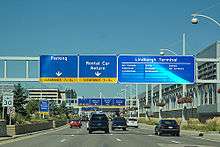
The larger of the two terminals, Terminal 1, officially has seven concourses, lettered A–G, although they are all interconnected and can be accessed by either the north or south security checkpoints. Terminal 1 has 104 gates with more gates being constructed in the coming years to accommodate the growing number of passengers. Concourse C has a tram that goes from Gate C1 to gate C27, with a stop in the middle near Gate C11. There is a skyway that connects concourse G with concourse C. All international arrivals at Terminal 1 from airports without border pre-clearance are handled at concourse G.
- Concourse A - 14 gates Delta
- Concourse B - 16 gates Air Choice One, Boutique Air, Delta
- Concourse C - 27 gates Delta
- Concourse D - 6 gates Delta
- Concourse E - 16 gates Air Canada, Alaska Airlines, American, Frontier, Spirit, United
- Concourse F - 16 gates Delta
- Concourse G - 22 gates Air France, Delta, KLM
Terminal 2 - Humphrey
The Humphrey Terminal 2 consists entirely of Concourse H. The old Humphrey Terminal 2, built in 1986, was rebuilt in 2001 to expand capacity and give passengers a more seamless experience.[11] The terminal now has 14 gates and will continue to expand in the coming years. Terminal 2 is Sun Country Airlines' hometown hub.
- Concourse H - 14 gates Condor, Icelandair, JetBlue, Southwest and Sun Country
.jpg)
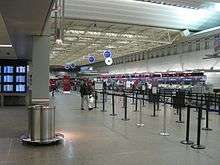
Facilities
Like many other airports, MSP interconnects with several other forms of transportation. Several large parking ramps are available for cars. Most other connections are made at the Hub Building and adjacent Transit Center, which has city and shuttle bus, taxi, light-rail and rental car service. Two trams (people movers) are at the airport. One carries passengers from the main section of Lindbergh Terminal 1 to the Hub Building and another runs along Concourse C in that terminal.
The airport is near Fort Snelling, the site of one of the earliest United States government settlements in the area. Both the Mississippi and Minnesota rivers flow nearby. Minnesota State Highway 5 provides the closest entrance to the Lindbergh Terminal 1, just a short distance from Interstate 494. The Humphrey Terminal 2 is accessed via the 34th Avenue exit from I-494, which runs past Fort Snelling National Cemetery. Delta Air Lines has hangars arranged along I-494 and 34th Avenue, so it's possible to see airliners undergoing maintenance while driving past.
.jpg)
The METRO light rail Blue Line[18] has stops at both the Hub Building Terminal 1 (Lindbergh Station) and Terminal 2 Humphrey Terminal (Humphrey Station). It connects the airport with downtown Minneapolis as well as with the Mall of America in nearby Bloomington and operates as a shuttle service between the two airport terminals. Travelers can use the rail line to go between the two sites at all times; it is the only part of the line that operates continuously through the night (the rest shuts down for about four hours early in the morning).[19] Two parallel tunnels for the line run roughly 70 feet (21 meters) below the airport and at 1.7 mi (2.7 km) in length are the longest tunnels on the route. The Lindbergh Terminal 1 station is the only one underground on the line, as the rails return to the surface near Humphrey Terminal 2. Due to current concerns about terrorism, a great deal of effort went into ensuring that the tunnels are highly blast-resistant. The underground portion was the costliest section of the entire rail project.[20]
Runways
Minneapolis–Saint Paul International Airport covers 2,930 acres (1,186 ha) and has four runways, all with high intensity lights.[2]
| Number | Length | Width | Condition | Surface | Frequency |
|---|---|---|---|---|---|
| 4/22 | 11,006 feet (3,355 m) | 150 feet (46 m) | Good | Concrete | 126.700 |
| 12R/30L | 10,000 feet (3,048 m) | 200 feet (61 m) | Excellent | Concrete | 126.700 |
| 12L/30R | 8,200 feet (2,499 m) | 150 feet (46 m) | Good | Concrete | 123.950 |
| 17/35 | 8,000 feet (2,438 m) | 150 feet (46 m) | Excellent | Concrete | 123.675 |
Runway 17/35 opened in October 2005. Prior to that time, a number of buildings (including several hangars and the City of Richfield's Rich Acres Golf Course) were demolished to make way for the runway protection zone of the new runway. Aircraft approaching Runway 35 fly slightly east of the Mall of America, overfly Interstate 494 and land seconds later. Due to noise concerns from south Minneapolis, between August 13, 2007 and October 18, 2007, Runway 17/35 was used regularly during construction on Runway 12R/30L.
Airport lounges
Armed Forces Service Center is an all free lounge for traveling military, which includes Active Duty, Reserve and National Guard personnel and their dependents, as well as Department of Defense and PHS employees (on orders) and other members of the uniformed services on active duty. The center is located in Terminal 1 on the mezzanine level above the main ticket area by checkpoint 1.
Delta Air Lines offers two Sky Clubs. Both are located in Terminal 1. One is located near the entrance to the F and G concourses. The second is located on the C concourse, near Gate C12.
Escape Lounge is a club that is open to all passengers for a fee. It is located in Terminal 1 on the mezzanine level of the Airport Mall.
PGA MSP Lounge is a members only club. It is located in Terminal 1 at the north end of the Airport Mall's mezzanine level at the intersection of concourses C, D & E.
United Airlines has a United Club in Terminal 1 between gates E6 and E8.
InterContinental Hotel (on-site)
InterContinental Hotels operates a full service on-site hotel at the airport with 291 rooms on 12 floors.[21] Originally intended to be open for Super Bowl LII in 2018, the hotel opened officially on July 30, 2018.[21] The new hotel is skyway connected to the airport with its own security checkpoint that connects to Terminal 1 at Concourse C. The hotel has an "observation bar" on the top floor. Also on the top floor is two luxury suites, the larger of the two is more than $3,000 per night with 1800 square feet of space. The hotel has specially designed floor to ceiling windows with views of both downtowns of Minneapolis and St. Paul. It also has sweeping views of the Minnesota River, Mississippi River and the entire airport.[22][23][24]
Other buildings
Delta Air Lines Building C is located on the property of Minneapolis–St. Paul International Airport and in Fort Snelling. Delta uses it for northern and regional operations. The building is located along 34th Avenue, which is the main access point to the airport terminals from Interstate 494, and across from the Fort Snelling National Cemetery. Building C is in a public access area of the airport, so visitors are not required to undergo security checks to access it. In 2009, as Northwest Airlines and Delta Air Lines merged, Delta removed all employees from Building A, the previous headquarters of Northwest in Eagan and all employees who remained in Minneapolis were moved to Building C, which was renovated and Building J. Facilities within the building include the Compass Airlines corporate headquarters, which moved there on December 16, 2009 and Delta SkyBonus offices. Endeavor Air is also headquartered in Building C. In 2013 Delta announced that the former Pinnacle Airlines, which became Endeavor, would move its headquarters from Memphis to MSP Airport and that it would occupy five stories.[25]
Prior to its disestablishment, Republic Airlines (1979–1986) had its headquarters in Building C. The Regional Elite Airline Services headquarters were in Building C.
Airlines and destinations
Passenger
Cargo
Statistics
.jpg)
Top domestic destinations
| Rank | Airport | Passengers | Carriers |
|---|---|---|---|
| 1 | Chicago–O'Hare, Illinois | 849,000 | American, Delta, United |
| 2 | Denver, Colorado | 837,000 | Delta, Frontier, Southwest, Spirit, Sun Country, United |
| 3 | Atlanta, Georgia | 753,000 | Delta, Southwest, Spirit |
| 4 | Phoenix–Sky Harbor, Arizona | 675,000 | American, Delta, Southwest, Spirit, Sun Country |
| 5 | Los Angeles, California | 612,000 | Delta, Spirit, Sun Country |
| 6 | Seattle/Tacoma, Washington | 553,000 | Alaska, Delta, Spirit, Sun Country |
| 7 | Las Vegas, Nevada | 530,000 | Delta, Southwest, Spirit, Sun Country |
| 8 | Dallas/Fort Worth, Texas | 499,000 | American, Delta, Spirit, Sun Country |
| 9 | San Francisco, California | 471,000 | Alaska, Delta, Sun Country, United |
| 10 | Orlando, Florida | 445,000 | Delta, Frontier, Southwest, Spirit, Sun Country |
.jpg)
Top international destinations
| Rank | Airport | Passengers | Yearly Change |
Carriers |
|---|---|---|---|---|
| 1 | 523,699 | Delta, KLM | ||
| 2 | 300,344 | Delta, Sun Country | ||
| 3 | 271,176 | Air Canada, Delta | ||
| 4 | 238,039 | Air France, Delta | ||
| 5 | 196,162 | Delta | ||
| 6 | 169,173 | Delta | ||
| 7 | 152,831 | Delta | ||
| 8 | 143,412 | Delta | ||
| 9 | 134,453 | Delta, Icelandair | ||
| 10 | 124,284 | Delta | ||
| 11 | 108,137 | Delta | ||
| 12 | 88,800 | Delta, Sun Country | ||
| 13 | 87,769 | Delta | ||
| 14 | 73,911 | Delta, Sun Country | ||
| 15 | 65,628 | Delta | ||
| 16 | 43,517 | Delta, Sun Country | ||
| 17 | 40,242 | Delta, Sun Country | ||
| 18 | 28,438 | Condor | ||
| 19 | 27,607 | Delta, Sun Country | ||
| 20 | 24,954 | Delta, Sun Country |
Airline market share
| Rank | Airline | Passengers | Share |
|---|---|---|---|
| 1 | Delta Air Lines | 25,995,533 | 70.65% |
| 2 | Sun Country Airlines | 2,411,903 | 6.56% |
| 3 | American Airlines | 2,363,226 | 6.42% |
| 4 | Southwest Airlines | 2,058,405 | 5.59% |
| 5 | United Airlines | 1,696,922 | 4.61% |
| 6 | Other | 2,268,306 | 6.17% |
Annual traffic
| Year | Passengers | Aircraft movements | Cargo (Pounds) |
|---|---|---|---|
| 2001 | 33,733,725 |
501,522 |
N/A |
| 2002 | 32,629,690 |
507,669 |
N/A |
| 2003 | 33,201,860 |
512,588 |
N/A |
| 2004 | 36,713,173 |
541,093 |
N/A |
| 2005 | 37,663,664 |
532,239 |
N/A |
| 2006 | 35,612,133 |
475,668 |
N/A |
| 2007 | 35,157,322 |
452,972 |
N/A |
| 2008 | 34,056,443 |
450,044 |
496,595,947 |
| 2009 | 32,378,599 |
432,395 |
402,981,750 |
| 2010 | 32,839,441 |
437,075 |
448,769,723 |
| 2011 | 33,118,499 |
436,506 |
434,468,322 |
| 2012 | 33,170,960 |
425,332 |
404,563,347 |
| 2013 | 33,897,335 |
431,418 |
409,255,621 |
| 2014 | 35,152,460 |
412,698 |
414,156,918 |
| 2015 | 36,582,854 |
404,762 |
410,010,641 |
| 2016 | 37,517,957 |
413,460 |
419,780,501 |
| 2017 | 38,034,431 |
416,213 |
505,828,614 |
Ground transportation
Road
The terminal buildings are directly located off of Minnesota State Highway 5. Several other major highways that border the airport are Minnesota State Highway 62, Minnesota State Highway 77, and Interstate 494.
Rail
The airport is served by the Terminal 1–Lindbergh station and Terminal 2–Humphrey station on the Metro Blue Line. There is free 24-hour service between the stations, while the rest of the line does not operate full-time.
Bus
Metro Transit operates bus route 54 to MSP. The bus stop is located at Terminal 1. Passengers arriving in Terminal 2 must take the light rail to the bus stop location.
Military facilities
The Minneapolis–Saint Paul International Airport Joint Air Reserve Station at MSP is home to the 934th Airlift Wing (934 AW), an Air Force Reserve Command (AFRC) unit and the 133d Airlift Wing (133 AW) of the Minnesota Air National Guard. Both units fly the C-130 Hercules and are operationally-gained by the Air Mobility Command (AMC). The 934th consists of over 1,300 military personnel, of which approximately 250 are full-time Active Guard and Reserve (AGR) and Air Reserve Technician (ART) personnel. The 133rd is similarly manned, making for a total military presence of over 2,600 full-time and part-time personnel.
The 934 AW serves as the "host" wing for the installation, which also includes lodging/billeting, officers club, Base Exchange (BX) and other morale, welfare and recreation (MWR) facilities for active, reserve/national guard and retired military personnel and their families.
MSP 2035 long-term comprehensive plan
In 2004, Northwest Airlines (since merged into Delta Air Lines) proposed expanding the Lindbergh Terminal 1 to accommodate growing flight operations in a plan known as the MSP 2020 Vision. The proposed expansion included moving all airlines other than Northwest Airlines and its SkyTeam alliance partners to the Humphrey Terminal 2. This caused increased concern about Northwest Airlines' control of the Minneapolis/St. Paul commercial air service market with some claiming that Northwest was using its market position to inflate airfares. While AirTran Airways voiced opposition to the plan, American Airlines and United Airlines remained neutral on the move since both had exclusive terminals at their own main hubs. Despite the merger between Northwest and Delta Air Lines, there are still plans in place to carry out these expansions. In August 2015, the Metropolitan Airports Commission (MAC) approved a plan that looks out to the year 2035. At the meeting the airlines were split into three groups: All SkyTeam airlines, Southwest Airlines and all other passenger airlines.
The MAC looked at the following requirements for the Lindbergh Terminal and all SkyTeam partners:
- 119 total gates are required in 2030
- 13 gates must accommodate wide-body aircraft
- Delta Air Lines and other SkyTeam airlines will have exclusive rights to the entire Lindbergh Terminal 1
- 63 gates must accommodate medium and large regional aircraft
- 20 gates must have access to international arrivals facilities
The MAC also looked into the following requirements for all Non-SkyTeam partners at the Humphrey Terminal 2:
- 36 total gates are required in 2030
- 2 gates must accommodate wide-body aircraft
- 30 gates must accommodate narrow-body jet aircraft
- 5 gates must have access to international arrivals facilities
The 36 gates required at the Humphrey Terminal in 2030 will serve predominantly narrow-body aircraft operated by airlines with hubs elsewhere and Sun Country Airlines, which operates a fleet of exclusively Boeing 737's. Most air service to MSP on these airlines are anticipated to be operated by common narrow-body aircraft such as the Boeing 737 or Airbus A320.[53]
Incremental airlines relocate
This plan is what has been chosen to maximize the capacity at MSP through 2035. It includes three phases through 2020, 2030 and 2035. The final product moves some but not all non-Delta airlines from Terminal 1 to Terminal 2, evens out capacity over the two terminals and will finish with as many as 15 new gates being constructed over both terminals and new parking garages.[54]
By 2020 (38 million annual passengers)
- Improve Terminal 1-Lindbergh terminal/land-side ~$728 million
- Milestone subtotal ~$728 million
By 2030 (48 million annual passengers)
- Add gates/parking @ Terminal 2-Humphrey ~$374 million
- Improve Terminal 1-Lindbergh terminal ~$292 million
- Improve area roadways ~$84 million
- Milestone subtotal ~$750 million
By 2035 (54 million annual passengers)
- Add gates/parking @ Terminal 1-Lindbergh ~$847 million
- Add gates/parking @ Terminal 2-Humphrey ~215 million
- Milestone subtotal ~$1.06 billion
Total 2035 LTCP Recommended Development Cost ~$2.54 billion
See also
References
- ↑ "Passenger and Traffic Statistics for 2016". Metropolitan Airports Commission. 2016. Archived from the original on April 27, 2017. Retrieved January 23, 2017.
- 1 2 FAA Airport Master Record for MSP (Form 5010 PDF), effective June 21, 2018.
- ↑ "List of Top 40 Airports in US - World Airport Codes". World Airport Codes.
- ↑ "Fort Snelling UT, Hennepin County, Minnesota". U.S. Census Bureau. Retrieved December 19, 2009.
- ↑ "2012 Minnesota Statutes". State of Minnesota. 2012. Retrieved June 24, 2013.
- ↑ "Minneapolis–St. Paul International Airport named Best Airport in North America for second consecutive year". Star Tribune. Retrieved 2018-03-06.
- ↑ https://www.usatoday.com/story/travel/flights/todayinthesky/2018/06/13/delta-air-lines-minneapolis-seoul-non-stops-begin-2019/698598002/
- ↑ "Aer Lingus to launch nonstop flights between Dublin and MSP". Star Tribune. Retrieved 2018-09-13.
- ↑ "Passenger and traffic statistics for 2010" (PDF). Metropolitan Airports Commission. 2010. p. 16. Archived from the original (PDF) on June 16, 2011. Retrieved October 13, 2011.
- ↑ "Delta celebrates new service between Minneapolis–St. Paul to Rome". Delta News Hub. Retrieved 2016-10-02.
- 1 2 3 4 "Fun Facts". Metropolitan Airports Commission. Archived from the original on June 9, 2012. Retrieved June 25, 2012.
- ↑ "Minneapolis–Saint Paul International Airport, Lindbergh Terminal, 4300 Glumack Drive, Minneapolis, Minnesota".
- 1 2 3 "Architecture Minnesota". Architecture Minnesota. Minnesota Society American Institute of Architects. 28 (1): 49. 2002.
- ↑ Hogan, Patrick (2013). "Minneapolis/St. Paul International Airport: Looking Back and Moving Forward" (PDF). Metropolitan Airports Commission. Retrieved May 28, 2018.
- ↑ Torbenson, Eric (May 31, 2002). "Two New Concourses to Debut at Minneapolis–St. Paul International Airport". St. Paul Pioneer Press. Retrieved July 1, 2012.
- ↑ Wascoe Jr., Dan (November 1, 2002). "New Concourse Opens at Minneapolis Airport's Main Terminal". Star Tribune. Minneapolis. Retrieved July 1, 2012.
- ↑ "One Day After 60K-Plus Passengers, MSP Officials Overjoyed". KSTP. Retrieved 2018-02-07.
- ↑ "These routes will change May 18". Metro Transit. Retrieved May 22, 2013.
- ↑ "Light Rail Transit". Metropolitan Airports Commission. Archived from the original on May 13, 2013. Retrieved May 22, 2013.
- ↑ "Hiawatha Line Before and After Study" (PDF). Metro Transit. August 2010. p. 23. Retrieved May 22, 2013.
- 1 2 Norfleet, Nicole (2017-05-06). "InterContinental hotel plans to open at MSP in summer 2018". Star Tribune. Archived from the original on 2018-04-28. Retrieved 2018-04-28.
- ↑ "Graves Hospitality reveals first airport hotel rendering after full commission approval". Retrieved November 27, 2017.
- ↑ "High-rise hotel will bring room service to MSP". Retrieved November 27, 2017.
- ↑ TEGNA. "New hotel at MSP Airport will be an InterContinental". Retrieved November 27, 2017.
- ↑ Phelps, David. "Pinnacle Airlines to move HQ, hundreds of employees to MSP" (Archive). Minneapolis Star Tribune. January 25, 2013. Retrieved on September 6, 2014.
- ↑ https://thepointsguy.com/news/aer-lingus-adds-yul-msp/
- ↑ "Dublin Airport Welcomes Aer Lingus' Transatlantic Expansion". Dublin Airport. 12 September 2018. Retrieved 12 September 2018.
- ↑ "Flight Schedules". Retrieved 7 January 2017.
- ↑ "St. Louis". Retrieved 29 January 2017.
- ↑ "Air France Network". Retrieved 1 April 2017.
- ↑ "Flight Timetable". Retrieved 29 January 2017.
- 1 2 "Flight schedules and notifications". Retrieved 7 January 2017.
- ↑ "Route Map and Schedule". Retrieved 26 February 2017.
- ↑ "Timetable". Retrieved 26 February 2017.
- ↑ https://www.delta.com/content/www/en_US/#/flightstatus/1/0171/2019-04-01
- 1 2 "FLIGHT SCHEDULES". Retrieved 7 January 2017.
- ↑ https://www.mlive.com/news/flint/index.ssf/2018/10/delta_pulls_the_plug_on_bishop.html
- ↑ "Frontier". Retrieved 7 January 2017.
- ↑ "Flight Schedule". Icelandair.
- ↑ "JetBlue Airlines Timetable". Retrieved 29 January 2017.
- ↑ "View the Timetable". Retrieved 26 February 2017.
- ↑ "Southwest Airlines schedules new routes in Jan 2019". Routes Online. August 2018. Retrieved August 5, 2018.
- ↑ "Check Flight Schedules". Retrieved 7 January 2017.
- ↑ "Where We Fly". Retrieved 29 January 2017.
- ↑ https://www.eturbonews.com/232175/sun-country-airlines-nonstop-to-belize-and-st-kitts-nevis
- ↑ "Sun Country expands to Nashville, adds six nonstop routes". Retrieved 14 August 2018.
- ↑ https://www.suncountry.com/About/News/2018-09-05.html
- ↑ "Sun Country Airlines". Retrieved 1 April 2017.
- 1 2 "Timetable". Retrieved 7 January 2017.
- ↑ "Minneapolis–St Paul International (MSP) Summary Statistics". Bureau of Transportation Statistics, US Department of Transportation. Retrieved September 30, 2018.
- ↑ "Minneapolis–St Paul International (MSP) International Statistics". Bureau of Transportation Statistics, US Department of Transportation. Retrieved July 6, 2015.
- ↑ "Metroairports.org - operations and passenger reports". metroairports.org. Retrieved 2018-02-12.
- ↑ "Archived copy". Archived from the original on March 4, 2016. Retrieved December 13, 2015.
- ↑ "LTCP MSP 2035".
External links
![]()
- Official website
- "Minnesota Airport Directory: Minneapolis–St. Paul International Airport (Wold–Chamberlain Field)" (PDF). Archived from the original (PDF) on March 21, 2003. (245 KB)
- MAC Noise Homepage (official—interactive maps of flights and noise data)
- Live Air Traffic Control streams including MSP
- Abandoned & Little-Known Airfields: Minnesota – used for information on former airports
- FAA Airport Diagram (PDF), effective October 11, 2018
- Resources for this airport:
- AirNav airport information for KMSP
- ASN accident history for MSP
- FlightAware airport information and live flight tracker
- NOAA/NWS latest weather observations
- SkyVector aeronautical chart for KMSP
- FAA current MSP delay information
- OpenNav airspace and charts for KMSP
- FAA Airport Master Record for MSP (Form 5010 PDF)
- Airport diagram for October 1959